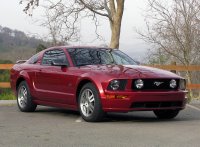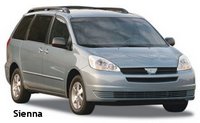 This morning's Wall Street Journal featured an article about what constitutes an 'American made' car. You see, it seems that the new Ford Mustang is made of of 65% american manufactured parts, while the Toyota Sienna is made of 90% American made parts. So, which is the icon of Americanism?
This morning's Wall Street Journal featured an article about what constitutes an 'American made' car. You see, it seems that the new Ford Mustang is made of of 65% american manufactured parts, while the Toyota Sienna is made of 90% American made parts. So, which is the icon of Americanism?I get my share of grief for driving a Toyota Camry -- especially given that several of our friends parents and/or grandparents rely for a living on the solvency of the GM pension fund. But as GM and Ford increasingly buy parts from overseas, and even have their cars assembled abroad, the distinction between American and Foreign-made gets increasingly fuzzy.
 I'm not sure you can even get a Sienna minivan in Japan. Not only are they manufactured in the US, but the whole concept of a 7-8 seat van with more cup-holders than the mind can grasp is very alien to just about any market other than the US. The Sienna is, in its way, as much a product of American driving tastes as the lumbering Ford Excursion.
I'm not sure you can even get a Sienna minivan in Japan. Not only are they manufactured in the US, but the whole concept of a 7-8 seat van with more cup-holders than the mind can grasp is very alien to just about any market other than the US. The Sienna is, in its way, as much a product of American driving tastes as the lumbering Ford Excursion. At the end of the day, I shop pretty strictly by car quality rather than assembly location. I think one of the reasons the Big Three auto makers got so far behind the curve in the 80s is that there were way too many people willing to buy American regardless of design or quality. As more and more Hondas, Toyotas, Nissans and even BMWs (none of those X5 and X3 BMW SUVs have ever seen Bohemia) roll off assembly lines in the American South and Southwest, it seems to me that Ford and GM need to come up with a better explanation of why people should buy their products than that buying a foreign brand will put American workers out of a job.
It seems "buy American" is simply cover for saying, "buy union" -- but saying that would reveal the coercion underlying the sentiment.
ReplyDeleteEither that, or its a reaction against the "unamerican-ness" of the corporate leadership, and that isn't very nice, is it? Particularly since Chrysler is a U.S.-European company -- does buying Chrysler cars count?
A car that is essentially equivalent to the Sienna (with one major difference) is sold in Japan under a different name: the Estima.
ReplyDeleteThe difference: It's a hybrid.
The Sienna is probably going to be the first mass-produced hybrid minivan sold in the U. S., if Toyota ever gets around to it. I wish they would hurry, as I plan to buy a Sienna in the next couple of years. I would so like it to be a hybrid.
We want to buy a Sienna, but the price tag is still rather prohibitive for us. Maybe in a few years... I don't have strong opinions on buying a hybrid, but if one can recoup the initial investment through better gas mileage that would be a point in its favor.
ReplyDeleteWell, I'll let you know how it is when I get mine :-)
ReplyDeleteWhen it became clear we were going to need to get a bigger vehicle (I'm pg with #3 right now and 3 carseats/boosters don't fit well in my existing car), I saw how many minivans there were to choose from and, in order to decrease the field, decreed: IT SHALL SEAT EIGHT. This narrowed the choices on car chassis down to three. Since then, two of them (Chevy Venture and Ford Taurus wagon) have stopped being made.
I suppose we could go to a full-size van, but I think the Sienna beats 'em on gas mileage. And mileage is pretty important to us.
We have a Grand Caravan, and it has served us well. It's a '99 with 130,000 miles, (90k of which isn't ours). We got it cheap ($5K cash), and have had to do minimal repairs here and there as well as a new transmission. However, the sum cost of all that, still puts us ahead today of where we would have been had we bought a new minivan back in '03 (assuming $20k+ pricetag).
ReplyDeleteI've noticed that "American" cars are now catching up to their "Japanese" counterparts with respect to reliability as well.
Sure, I wouldn't mind a new vehicle, but I really don't want a car payment. Besides, a Suburban (seats up to 9) is more my style. It's built around the same drive-train and chassis as my truck, which will last "forever" with proper maintenance. It's built "tough" because it serves as a backbone in so many commercial and agricultural settings. I can live with the gas bill. However, I don't see myself dishing out $35k+ on a new vehicle any time soon.